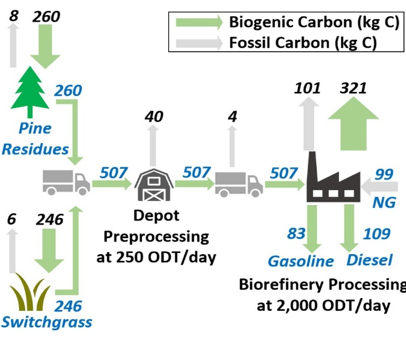Pathways to Sustainable Bioeconomy
Bioeconomy is an emerging concept that uses biomass to produce energy, chemicals, and products. Biomass is related to many nature-based solutions to climate change. The Yao Lab develops systems analysis tools to understand the carbon, environmental, and economic implications of different biomass conversion technologies throughout their life cycle. The research aims to assess, identify, and optimize different pathways to a sustainable bioeconomy future.
The Yao Lab has multiple ongoing projects under this research direction. Those projects investigate a variety of biomass conversion technologies for producing biofuels, bio-chemicals, and wood-based materials. An overview presentation given by Prof. Yuan Yao is available on YouTube.
https://www.youtube.com/watch?v=12e6z_nMKlQ&feature=emb_logo
Biofuel is a sustainable substitute to traditional fossil fuels and has a great potential for reducing Greenhouse Gas (GHG) emissions and enhancing energy security. Biorefineries can be designed for co-producing biofuels and high value-added biochemicals. Large-scale biofuel production faces economic and technical challenges related to feedstocks (e.g., inconsistent biomass quality), biorefineries (e.g., challenges in process control and operations), and supply chains (e.g., high transportation costs and risks). Different biomass conversion technologies and supply chain design also have varied environmental impacts. Our research focuses on understanding the technical factors driving biofuels’ economic feasibility and environmental performance and identifying the optimal process and supply chain design for maximum environmental benefits and minimum risks.
Watch this video of our biofuel publication featured by the journal of Global Change Biology Bioenergy.
https://www.youtube.com/watch?v=RtID7W4rpew&feature=emb_logo
One type of biomass with a strong interest in the Yao Lab is wood from the forest. Forest provides essential ecosystem services and generates biomass for producing bioproducts such as cross-laminated timber, pulp and paper, biofuels, and valuable biochemicals. Understanding the sustainable implications of different forest utilization pathways is challenging given the complex dynamics of forest and manufacturing supply chains. The Yao Lab develops advanced life cycle modeling approaches that integrate forest dynamics with the manufacturing, use, and end-of-life of wood-derived products. The goal of our research is to identify science-based strategies for maximum system-wide carbon and environmental benefits.

Simplified carbon flows of biomass supply chains for using forest residues and switchgrass to produce biofuels.